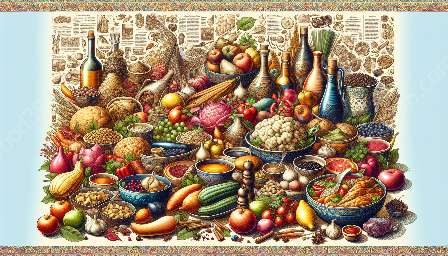Early societies relied on food surplus and specialized occupations to sustain themselves, shaping the development of food cultures and early agricultural practices. This article delves into the fascinating link between these concepts and their impact on the origin and evolution of food cultures.
The Role of Food Surplus in Early Societies
Food surplus played a crucial role in the development of early societies. As agricultural practices evolved, humans learned to produce more food than necessary for immediate consumption, leading to the accumulation of surplus. This surplus, in turn, facilitated the rise of specialized occupations as not everyone needed to be involved in food production.
With food surplus, individuals were freed from the daily demands of securing food, allowing them to specialize in other occupations such as pottery-making, tool crafting, or religious roles. This diversification of labor laid the foundation for the formation of more complex societies, as people could trade their specialized goods and services for the surplus food produced by others. The presence of a food surplus also enabled the growth of populations, as reliable access to food supported larger communities.
Specialized Occupations and Early Agricultural Practices
Specialized occupations were closely intertwined with early agricultural practices. As early societies transitioned from a nomadic lifestyle to settled agricultural communities, individuals began to specialize in activities beyond food production.
For example, the emergence of metalworkers was essential for crafting tools and implements for agricultural purposes, further advancing farming techniques and output. Artisans specialized in creating containers for food storage, contributing to the preservation of surplus food. The need for efficient food production and processing also led to the development of specialized roles such as bakers, brewers, and cooks, shaping the early food cultures of different societies.
Moreover, specialized occupations within the agricultural sector, such as irrigation experts or land surveyors, emerged to optimize food production and ensure the sustainability of surplus yields. These roles played a pivotal part in advancing early agricultural practices and enhancing the overall food surplus of early societies.
Impact on the Origin and Evolution of Food Culture
The interplay between food surplus, specialized occupations, and early agricultural practices significantly influenced the origin and evolution of food culture in early societies.
With surplus food available, communities were able to engage in feasting and elaborate food rituals, marking the beginning of food culture as a social and symbolic practice. Specialized artisans imparted local flavors and culinary techniques, contributing to the diversification of food cultures across different regions. The presence of surplus food also facilitated trade and cultural exchange, leading to the enrichment of food cultures through the introduction of new ingredients and cooking methods.
Furthermore, the emergence of specialized roles such as chefs and food processors elevated the art of cooking and food preparation, laying the groundwork for the development of distinct culinary traditions that characterize early food cultures. The communal nature of feasting and sharing surplus food fostered social cohesion and identity within early societies, forming the basis for cultural food practices.
Conclusion
Food surplus and specialized occupations were fundamental elements in the progression of early societies, shaping the development of food cultures and influencing early agricultural practices.
From the creation of surplus through agricultural activities to the rise of specialized occupations contributing to the evolution of food culture, these interconnected concepts played a pivotal role in shaping the fabric of early human societies. Understanding the dynamics between food surplus, specialized occupations, and the origin of food culture offers valuable insights into the complexities of early societies and the foundations of our modern food systems.


